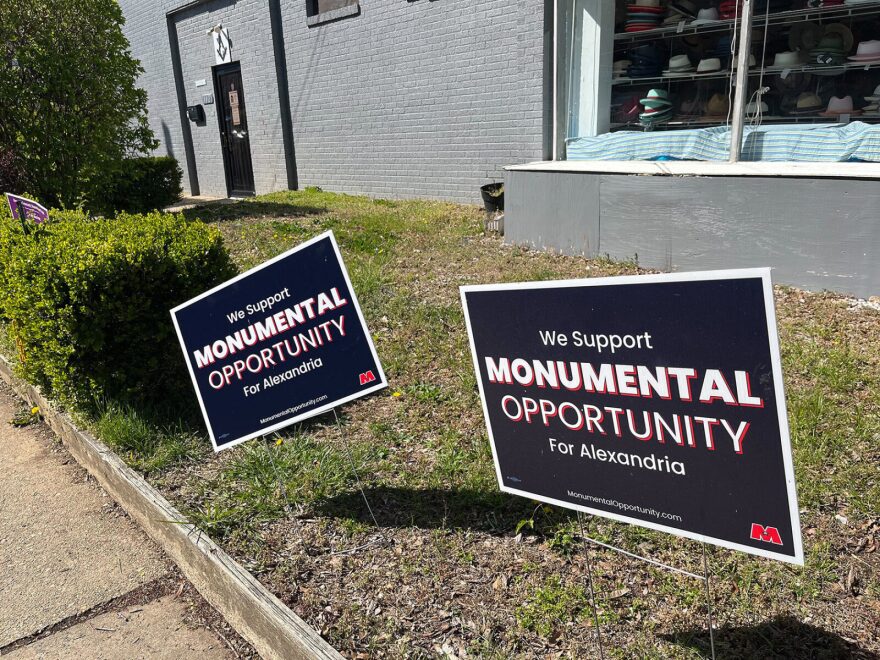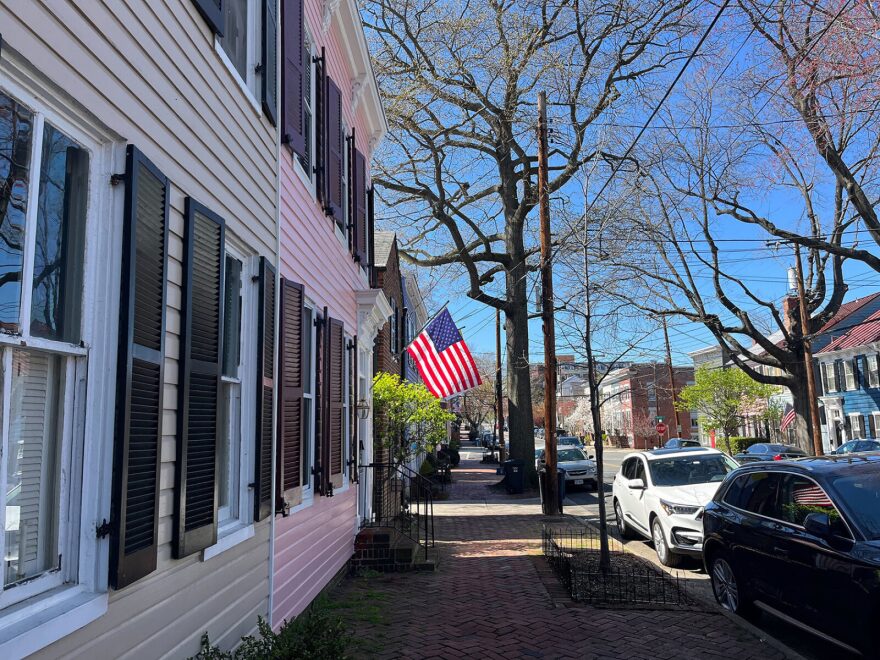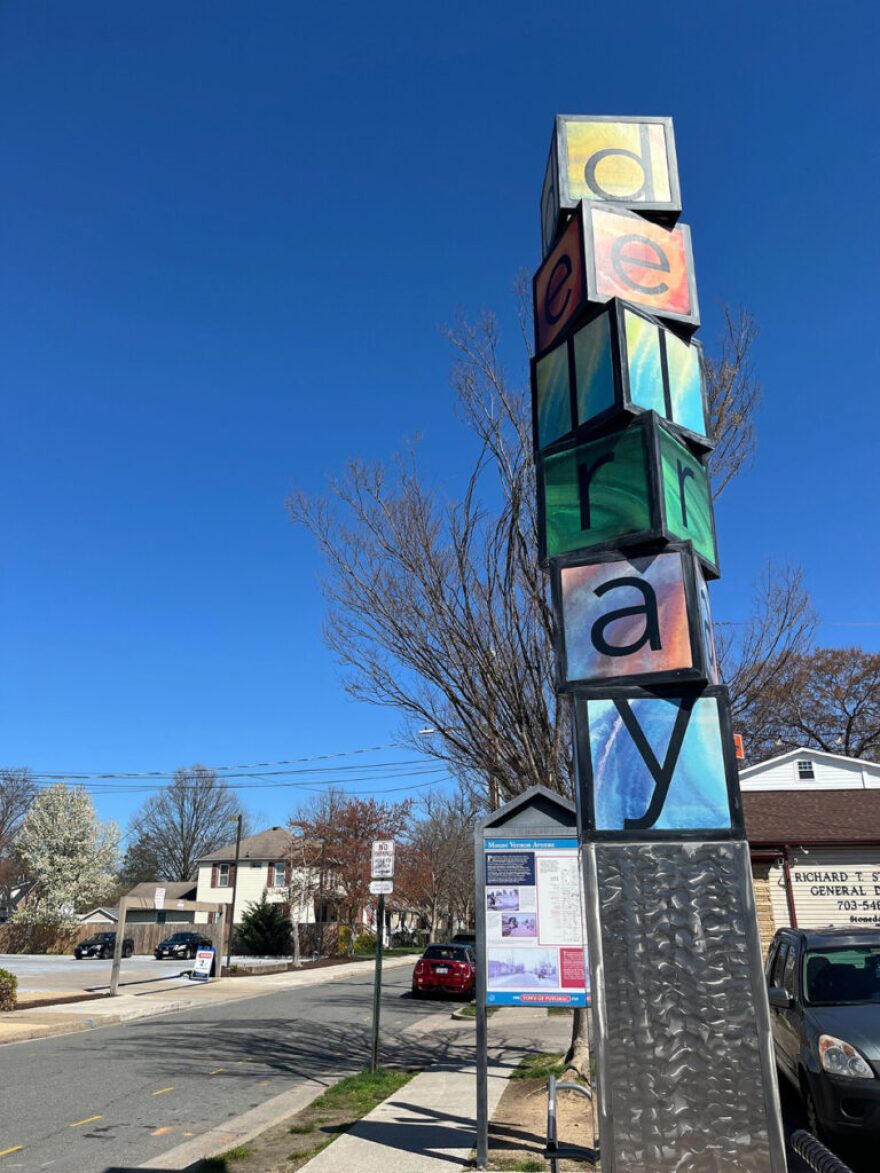Read the original story on WAMU's website.
Aria Velz rents an apartment in Del Ray with her wife and dog. They’ve lived in the Alexandria neighborhood for four years, and it has all the hallmarks of home: a favorite coffee shop, a walking path for dog walks and even the spot where Velz proposed.
Lately, it’s also had a lot of yard signs: The white and red ones that say "Stop the arena" and the blue ones that support “a Monumental Opportunity.” Also in the mix: signs for candidates running in the Democratic primary for City Council and mayor in June.
“I think the stadium is a catalyst [for] people talking about the future of the neighborhood,” Velz said. “But if it wasn’t an arena, if it was something else, these same conversations would [still] happen.”
Of course, the much-debated proposal to move the Washington Wizards and Capitals to a new arena and entertainment district in Potomac Yard is dead, after Alexandria officials announced they were pulling out of negotiations — and D.C. officials announced they’d come to an agreement to keep the teams at Capital One arena.
Velz didn’t like the arena idea, though as a theater director, she said maybe the piece of the proposal that included a performing arts venue deserved a second look. But the plan has gotten her and her fellow Alexandrians thinking and talking, sometimes loudly and with go-go music, about what they do want for Potomac Yard and, by extension, their hometown. Velz’s ideas include restaurants, a movie theater and lots more dense housing.
“That should be the future of a lot of cities, like having a lot of people around, having a lot of places to go, where you’re not totally tied to having a car to get around,” Velz said.
The arena plan wasn’t the only contentious recent debate about Alexandria’s future. The city’s Zoning for Housing policy, which ended single-family zoning and made other zoning changes geared toward incentivizing more housing construction, also accentuated deep disagreements among residents over how they want Alexandria to grow in the future — or whether they want it to grow at all.
“I think everyone is probably sort of like, ‘Can we take a breath? Can we just take a moment? Can we take a pause?’” said Katie Waynick, the president of the Del Ray Citizens Association. “It sort of feels like the tempo and the temperature is just amping up.”
But the calendar isn’t giving anyone in Alexandria a pause: The city’s budget season is now in full swing and elections are ahead in June.
Tax revenue gap
Sooner or later, nearly every conversation about the arena circled around to the word “revenue.” Velz, who’s been to plenty of public meetings on the subject, uses it. So do city leaders, including Mayor Justin Wilson, who supported the arena project as one way to boost lagging commercial tax revenue.
“Either we have a very different level of expectations of our taxpayers or we grow economically in a way that we haven’t in the past,” Wilson said. Opponents of the arena criticized the revenue projections as overly rosy, a frequent critique from economists who study public financing for sports stadiums.

Regardless of what money the now-dead arena could brought in, Alexandria relies heavily on its residential taxpayers. Residential taxes will fund about 82% of the city budget this year, the direct result of falling commercial real estate assessments post-pandemic, according to city manager Jim Parajon’s budget message.
By contrast, the city’s neighbors in Arlington and Fairfax have well-established commercial corridors in Tysons and Rosslyn-Ballston that have helped shift the burden off residents. Those areas have also been slowed down by the pandemic changes in office work.
In his message announcing the end of Alexandria’s consideration of the arena deal, Wilson pledged to continue searching for “economic opportunities that improve our quality of life and our economic health.”
Not everyone agrees with Wilson and most of the current City Council, who have prioritized bringing in new development to the city. Some residents think the pace of change has been too fast.
“I’d like to see us focus on the real quality of life things, not getting bigger,” said Andrew Macdonald, co-founder of the Coalition to Stop the Arena and a former city vice mayor. “That means preserving the historic core of these neighborhoods, not letting too much big development come in.”
He said he’d be comfortable with a performing arts venue of some sort or perhaps some kind of higher education presence in Potomac Yard, similar to Virginia Tech’s new campus, which came to the city as part of the Amazon headquarters deal in Arlington.
“It’s not that I’m not pro-development,” he says. “We need development, but it just needs to be thought about in a different kind of way.”
Money for housing, schools
In the meantime, the pressures on the Alexandria budget are very immediate, and so are the pressures on the members of the City Council, many of whom are running for re-election or are hoping to succeed Wilson as mayor.
Public hearings on the budget have been packed with advocates calling for added funding for schools, housing, and aid for residents at risk of displacement. Many Alexandrians think that list of concerns, plus fallout from the arena, are likely to be the key issues for voters in June.
In response to community demand, the council advertised a 4-cent tax rate hike, which essentially sets the ceiling for how high they could raise taxes.
Luz Castillo, a child care worker who lives in the area, is worried that rising rents might push her out of the neighborhood she’s called home for 14 years. She and other residents organized by Tenants and Workers United have been pushing for $10 million to expand a guaranteed income program and another $10 million to fund a local housing voucher program.
Castillo watched the arena debate play out with trepidation.
“We as a community that is here nearby was not ready to receive this big impact,” she said in Spanish through an interpreter. “It’s not like we were against it, but it’s just simply our city wasn’t ready for this, especially because we’ve seen that there’s been not enough housing initiatives.”

Other groups have asks of the current budget, too: Clergy group Virginians Organized For Interfaith Community Engagement wants the city to dedicate an additional $10 million to delayed affordable housing projects — and to find $20 million in recurring revenue to dedicate to preserving and constructing affordable housing in future years.
Father Santiago Rodriguez, who leads Grace Episcopal Church and is a VOICE leader, sees a connection between the community debate over the arena and his advocacy for affordable housing in Alexandria.
“Some of the most important questions that we ask [are] ‘How do we use our land? Who can get to use that land and how do they use it?’” he said. “Those are some of the questions that we need to continue asking, as we want this city to grow into an equitable, just, fair place that includes everyone.”

And then there are the parents and teachers demanding the city fully fund cost-of-living adjustments for educators and other priorities included in the school board budget — but not funded in the city’s draft.
Middle school science teacher David Paladin-Fernandez said schools are struggling to get kids caught back up academically and emotionally after the pandemic, and to serve an increasingly large number of students learning English. He’s a regular at school board and City Council meetings to press the point.
“Every single time I get up there, I am trying to convey the basic message of ‘We need help. We are being left behind,’” he said.
Paladin-Fernandez said he wasn’t wholly opposed to the arena plan — and acknowledged the concerns about revenue. But he said city leaders could have done a better job of building community consensus.
He wondered how that might impact voters’ decisions in June.
“This election really is Alexandria’s opportunity to make a definitive choice about which direction we want our city to go in,” he said. “I hope that we go in the direction of taking care of [our] people … and then we can start focusing on the business developments, the high raises and everything like that.”


